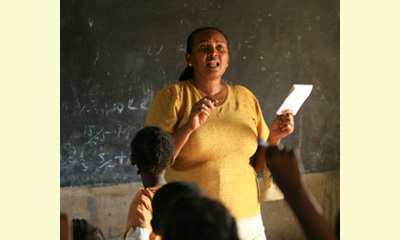|
|
World needs more teachers, quality education: UN agencies
un article par Dianne Penn, United Nations
The world will need to recruit more than five
million teachers if the Millennium Development Goal
(MDG) of universal primary education is to be
achieved by the 2015 deadline, according to four UN
agencies.

© UNESCO/Antonio Fiorente - Education in Ethiopia
click on photo to enlarge
In a message marking World Teachers' Day, observed
this Saturday (5 October), they say this challenge
goes beyond numbers as more teachers must also mean
better quality education through training and
support.
Guy Ryder heads the International Labour
Organization (ILO) which put out the message
together with the UN Educational, Scientific and
Cultural Organization (UNESCO), the UN Development
Programme (UNDP) and the UN Children's Fund
(UNICEF).
"The key to our future is indeed in many ways in
the hands of today's teachers; and the key to the
future of teachers is in our hands. We must ensure
that teachers and the basic human right of
education do not become easy prey in the drive to
cut public spending. Governments, the business
community and workers' organizations need to take
the lead in encouraging more talented women and
men to take up this very noble profession."
The UN labour chief also emphasized the need to
better link quality education, teaching and better
jobs to ensure that learning today translates into
employability tomorrow.
Note: Thank you to Janet Hudgins, the CPNN reporter
for this article.
|








|
DISCUSSION
Question(s) liée(s) à cet article:
What is the United Nations doing for a culture of peace?,
* * * * *
Commentaire le plus récent:
Following the Second High Level Forum of the United Nations on the Culture of Peace, Anwarul Chowdhury, a former Under-Secretary General of the UN, had this to say about what the UN is doing for a culture of peace. His remarks were published by the Independent European Daily Express.
Civil society worldwide has been in the forefront of the global movement for the culture of peace, working diligently and patiently at the grassroots level, he said.
"I find it is the governments and power structures which are the most persistent foot-draggers with regard to advancing the culture of peace through policy steps and action," said Chowdhury, a former U.N. under-secretary-general and currently representing civil society and the Global Movement for the Culture of Peace. . .
The United Nations, he pointed out, has shown great vision by adopting its historic, norm-setting Declaration and PoA on the Culture of Peace in 1999, but has not been organised enough in making the document a system-wide flagship effort of the world body.
"I am a believer that the world, particularly the governments, will come to realise its true value and usefulness sooner than later," Chowdhury said.

|
|









